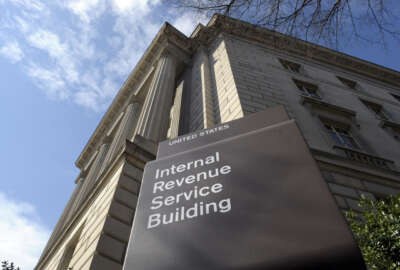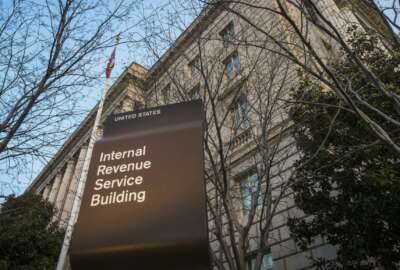
Can IRS pay tax refunds during shutdown? It depends who you ask
The IRS's decision to begin this year's tax filing season on time, and to start issuing tax refunds despite a partial government shutdown, appears legally sound...
Best listening experience is on Chrome, Firefox or Safari. Subscribe to Federal Drive’s daily audio interviews on Apple Podcasts or PodcastOne.
The IRS’s decision to begin this year’s tax filing season on time, and to start issuing tax refunds despite a partial government shutdown, appears legally sound, according to former government officials, but raises logistical questions from lawmakers and current agency employees.
Democratic lawmakers on Wednesday challenged the Trump administration’s attempt to ensure tax refund checks and food assistance programs stay running at otherwise shuttered agencies, and questioned whether keeping them operating under these conditions has made good on the White House’s promise to make the shutdown “as painless as possible.”
“There was a government shutdown, and they caused it, but they didn’t want the public to have to see that,” Rep. Gerry Connolly (D-Va.) said in a press conference Wednesday, referring to the IRS’s efforts to issue tax refunds and the Agriculture Department’s plan to pay out February Supplemental Nutrition Assistance Program (SNAP) benefits before a Jan. 20 deadline.
“I think all of those are questionable activities. I think they further degrade morale in the federal workforce, and I don’t think the American public is fooled by it,” Connolly added.
Sens. Ben Cardin (D-Md.) and Chris Van Hollen (D-Md.), in a letter Wednesday, asked IRS Commissioner Chuck Rettig to provide “as much certainty as possible to the IRS workforce on the agency’s plan and on what they can expect if the shutdown continues.”
“While the IRS’s announcement confirmed that tax filing season would begin later this month, we remain concerned that the disruption caused by the shutdown will cause prolonged delays in getting refunds out to American taxpayers,” the senators wrote.
On Monday, the Office of Management and Budget said the IRS would start issuing tax returns on Jan. 28, regardless of whether the shutdown continued for that long.
That decision, the IRS acknowledged, runs counter to the decision OMB made in 2011, when it directed the IRS not to pay refunds when a shutdown appeared likely, but was averted.
‘Longstanding exceptions’ to Antideficiency Act
So how can the IRS issue refund checks without lawmakers passing a spending bill?
A senior administration official explained the IRS has an “indefinite permanent appropriation” to issue tax refunds, even during a lapse in congressional funding.
“That means that Congress meant for those checks to go out — there’s money there always,” the official said in an interview Thursday.
Not paying refunds, even during a shutdown, he said, would be “thwarting the will” and intention of Congress.
“When the lapse in appropriations occurs, it doesn’t impede the actual funds that go into the tax refund. What it impedes is the discretionary budget that the IRS has to process the tax returns and take the administrative steps to issue a payment,” Danny Werfel, a former acting IRS commissioner, said in an interview Wednesday.
However, the question still remains: Does the IRS have a relevant exception to the Antideficiency Act, which prohibits agencies from spending funds that Congress hasn’t appropriated?
The law has several exceptions, notably “cases of emergency involving the safety of human life or the protection of property.”
The senior administration said multiple administrations have held the view it’s “necessarily implied” agencies have the right to exempt more employees under a shutdown, as long as it involves indefinite permanent appropriations.
“There’s the law, and then there are exceptions to the law — longstanding exceptions to the law. There are judgment calls within those exceptions,” the administration official said.
Werfel also acknowledged that Trump administration officials and lawyers have a broad set of exceptions and legal language to interpret.
“It’s a really challenging determination for lawyers to make because the law doesn’t delineate each and every activity, what would stay open and what wouldn’t. It’s subject to interpretation,” he said. “You could go through and you could scrutinize every shutdown plan, and you could likely have a robust argument on many sides of the underlying legal questions, in terms of how to assess whether the exception should be triggered or not.”
IRS to start tax filing season on time
The IRS determined it would open its filing season on-time this year, despite concerns last month that the shutdown would push back the start date.
The last time a shutdown this long happened in October 2013, the IRS made the decision to delay the 2014 filing season by a week.
Werfel explained that October is a busy month for the IRS, in terms of developing and testing information technology systems and other processes. In addition, the agency’s IT staff faced a bigger than usual workload, due to the launch of the Affordable Care Act.
“There was a lot going on in terms of the responsibilities that the technology team had at the IRS,” Werfel said.
The IRS was essentially left with a choice: Whether or not it could try and complete all of the relevant IT updates in order to have the tax filing season begin on time.
“But if we did that, there was a risk and a percentage probability that the systems wouldn’t be ready or there would be some type of mission-critical failure or glitch when the systems went live,” Werfel said.
More Government Shutdown News
By delaying the filing season by a week, Werfel said the agency managed to “significantly reduce that probability of a problem.”
“It is a classic tough decision between two not great choices,” he said. “On the one hand, open on time with a risk level that we were not typically confronting at the start of a filing season, or delay a week, which has its own pain points associated with it.”
According to a 2013 OMB report, about $2.2 billion individual tax refunds and $1.5 billion in business were delayed as a result of the IRS pushing back the filing season start date.
The IRS finds itself in nearly the same situation as in 2013. In addition to the disruption caused by the shutdown, the agency, under the Tax Cuts and Jobs Act, has to update about 450 forms and 140 IT systems in time for the 2019 filing season.
Before the shutdown, the IRS Advisory Council in November found the agency still didn’t have all the guidance it needs to fully implement the tax reform law.
Since 2011, Congress has cut the IRS’s annual budget by more than $2 billion, or about 16 percent.
“Based on their decision to open the filing season on time, it appears that they have taken all the necessary steps, done all the necessary testing, made all the changes, which is really impressive especially given the next tax law and the changes at play to get this done on time,” Werfel said.
Workforce attrition complicates readiness
A former OMB official told Federal News Network the IRS’s refund process is “highly automated” and doesn’t require additional staff to operate it, beyond the core of essential employees it will need to operate under its filing season contingency plan.
“I could see that IRS might justify its authority to process refunds during this shutdown on the basis that (1) the funding authority to pay refunds exists in Title 31, and (2) they don’t have to bring in additional staff to process them,” the OMB official wrote in an email Thursday.
However, a furloughed IRS employee, who requested anonymity to speak freely on the issue, said efforts to streamline refund processes have stalled because the agency’s most experienced career employees have retired.
“We’re trying to do process improvement work and some automation, but with the attrition we’ve had over a number of years, we haven’t been able to automate at the same rate that we’ve been losing people,” the IRS employee said. “The people who would help us with that automation have retired.”
The agency employee, who is retirement eligible, estimated that 30-40 percent of his workplace is retirement eligible. More than a quarter of the IRS’s total workforce is eligible for retirement, according to the agency’s FY 2018-2022 strategic plan.
The agency, the furloughed employee added, still faces a general hiring freeze.
“There have always been a few mechanisms for exception hiring, but those are not large quantities,” he said. “They’re small pieces here and there.”
In addition, the IRS employee warned that the agency has relied on its teams of subject-matter experts to offer guidance on exemption processing under the Tax Cuts and Jobs Act.
“The routine stuff you can automate, but the exceptions and the unusual cases rely on those subject matter experts,” he said.
The IRS hires seasonal employees to handle the caseload of individual tax returns, and typically trains them in early January, but the shutdown has postponed that training.
“They’re not showing up now, so they’re going to show up late. And with a big change in the tax law, there’s a lot more training that’s necessary, even if they came back from having been a seasonal employee last year,” the furloughed IRS employee said.
Updated shutdown guidance ‘in the coming days’
The IRS, as of Thursday, has not yet posted an updated contingency plan for the upcoming filing season, and an IRS spokesman declined to give an estimate of when the agency would release its updated shutdown guidance.
“The latest info we [have] was in the news release,” the IRS spokesman said in an email Wednesday afternoon. “That’s still current.”
The IRS on Monday said it would publicly post the new contingency plan “in the coming days.”
According to the IRS’s fiscal 2018 filing season contingency plan, the agency would exempt 43.5 percent of its total workforce. Currently, only 12.5 percent of agency employees are exempt.
The furloughed IRS employee said Wednesday he has yet to receive any update from the agency about an upcoming change in shutdown plans.
Federal News Network reporter Nicole Ogrysko contributed reporting.
Copyright © 2024 Federal News Network. All rights reserved. This website is not intended for users located within the European Economic Area.
Jory Heckman is a reporter at Federal News Network covering U.S. Postal Service, IRS, big data and technology issues.
Follow @jheckmanWFED
Related Stories

January shutdown may force IRS to exempt more employees, delay filing season




